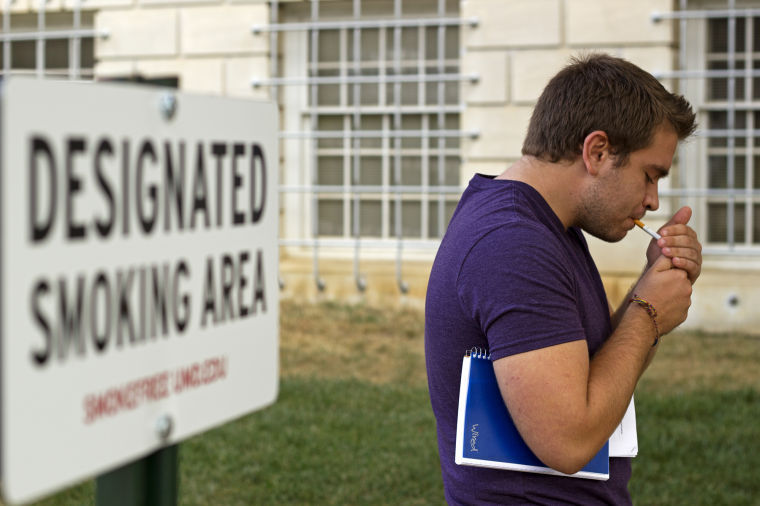
Zak Glennon, a junior philosophy major, prepares to light a cigarette outside of McKeldin Library, in one of the Campus’ new designated smoking areas.
As tobacco companies work to develop products to attract a new generation of consumers, university researchers are trying to better understand how these items can harm public health.
The Food and Drug Administration and the National Institutes of Health are launching a Tobacco Center of Regulatory Science at this university, one of 14 centers of its kind across the nation. The university received about $19 million from the two federal departments to fund the research.
Among other research efforts, scientists at the center will compare brain reactions to smoking menthol cigarettes and smoking regular cigarettes, said Pamela Clark, director of the center and a behavioral and community health professor.
In 2009, Congress passed the Family Smoking Prevention and Tobacco Control Act, which gave the FDA the authority to regulate tobacco and banned almost all flavored cigarettes, excluding menthol cigarettes.
The concern with flavored cigarettes and tobacco products, Clark said, was that children might find them appealing. Adults, she said, are often more interested in just the tobacco flavor. Through her research, Clark found young adults who start smoking tend to choose menthol cigarettes.
Sophomore Dane Epstein, who started smoking when he was 14, said he enjoys casual hookah smoking for the taste and social aspects. When he first started smoking, he did tricks but never fully inhaled.
“Once, I did inhale, though, and I got a head rush and liked that feeling,” said Epstein, a criminology and criminal justice and government and politics major. “Now it’s a habit.”
About 19 percent of adults in the U.S. smoke cigarettes, according to the Centers for Disease Control and Prevention. The CDC also reported cigarette smoking is the leading cause of preventable death in the country.
Though he’s tried to quit a few times, sophomore computer engineering major Peter Arsenyev said he finds it difficult to break the habit.
“It’s just a crutch I go back to,” Arsenyev said. “It’s a way I procrastinate — if I don’t feel like studying, I’ll go for a smoke break.”
Shoshana Gruber, a senior community health major, started working over the summer in the Center for Health Behavior Research lab, an existing lab where the new center will be incorporated. As an aspiring nurse, she said her experience at the lab could give her insight into smokers’ minds.
“I think that if more research were done, we can hopefully stop people from smoking altogether because it really does cause so many horrible health problems,” Gruber said. “Now I’m a lot more informed, so I can really understand why people use [tobacco] and what exactly they are using.”
The center, which includes a training component, is looking to recruit postdoctoral and graduate students to work there starting in its second year, Clark said.
Researchers also hope to gain better insight into how tobacco companies market their products, Clark said. As university policies continue to cut back on the number of places where people can light up — smokers are currently limited to four designated areas on the campus — Clark said companies are marketing tobacco products for people to use anywhere. Dipping tobacco, a packet of smokeless tobacco people put in their mouths, is one such product.
Though the 2009 FDA act placed restrictions and regulations on tobacco product marketing and advertising, some companies are still catching the attention of potential smokers, said public health school dean Jane Clark.
“Who knows what creative ways they might be trying to package nicotine, package cigarettes?” Clark said.
Some smoking ads have caught the attention of junior geology major Shelley Porter, who started smoking at 13.
“I like that the ads show a sense of community around smoking,” Porter said. “Smoking is how I made most of my friends — it’s pathetic but true.”
However, the ads are hardly the reason Alec Jaensch said he keeps buying cigarettes. The freshman enrolled in letters and sciences said he started smoking because his friends did, even though he knew it was bad for his health.
“Smoking is a decision you have to make for yourself, completely without help from ads,” Jaensch said. “The fact that they make smoking seem like it’s cool bothers me. They glamorize something that’s really not too good — it’s not right.”
And despite seeing required disclaimers placed on ads and cigarette packs, Jaensch said he’s not turned off by the warnings.
“It makes you think, but in the end, you’re going to do what you’re going to do,” he said.



